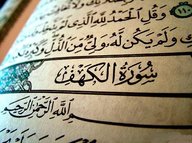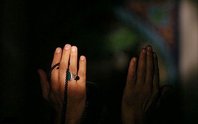
In our second Tadarrus session yesterday night on Surah al-Kahf, we covered the story of the Owners of the Two Gardens. While the lessons on greed, pride, thanklessness and being unappreciative of Allah’s blessings were clearly fleshed-out (and these characteristics are all present within everyone of us still), there is another profound yet beautiful lesson contained within these verses. For me, it is a stark lesson on the temporal nature of everything: and in this case, reflected by the aftermath of a disobedient and audacious servant of Allah s.w.t.
Verse 45 seems to encapsulate this notion and it is translated to mean: “And present to them the example of the life of this world: [its being is] like rain which We send down from the sky, and the vegetation of the earth mingles with it and [then] it becomes dry remnants, scattered by the winds. And Allah is ever, over all things, Perfect in Ability.”
Allah s.w.t. offers us to consider our life in this world like those elements mentioned above: rain sent from the sky, which results in good harvests and vegetation, caused by the mingling of the rain and dry earth, and in time the harvests or the land becomes dry remnants, and finally in that state, it gets scattered by the winds at last!
This is an exact reflection on life: everything happens only by the Will and Blessings of Allah s.w.t., and through that blessing we achieve success, yet although we must work for that success, it only comes from Allah’s inspiration and guidance. Eventually, we amassed wealth and authority in the land but when the time appointed arrived, we have to leave the material wealth behind or relinquish our worldly position either through retirement or death. In short, everything happens from Allah and by Allah. He alone Gives, and He alone Takes. We have and hold nothing, except for Taqwa and contentment of the heart.
No one is exempted from this cycle of life. While at one point you may have it all, it will definitely one day perish or diminish. Conversely, you may be disadvantaged due to poverty or a devastating experience of losing something/someone, but what life teaches us is that even this is also temporary. SubhanAllah! It truly reminds us not to be too materialistic with worldly possessions and pleasure, because surely that will be one of the fitnahs of Dajjal in the last days.
This brings us to a paramount question: if we are not to hold on dearly to the possessions of the world, what do we hold on to? People are usually measured by their academic qualifications, by the location and type of their residence, by the car they drive, by the position they hold in their jobs, by the travel destinations they journey, by the brands of their wallets and bags, and especially now, by the food they consume as reflected in their Instagram accounts.
These are in fact, simulated hyper-reality: created to give an impression of a certain lifestyle and standard of life that is not real. We all know that Person A (for example) on Instagram or Facebook is not the same person we know in reality. As this created hyper-reality gets perpetuated, even Person A begins to believe in his made-up world. In the end, what is Reality?
The antithesis of this is that we must first and foremost traverse beyond such superficiality and value people for who they really are as a person, and not by their wealth or their jobs. When was the last time we look at a person and get attracted to his/her piety, to his/her penchant for charity, to his/her knowledge of the Deen, to his/her discipline in reading the Qur’an? These are the yardsticks that we ought to measure ourselves. In the end, we will all stand before Allah s.w.t. on the Day of Judgement bringing nothing, and being judged by nothing, except Taqwa. He says in Surah al-Hujurat 49:13 “Indeed, the most honourable among you in the sight of Allah is the most Taqwa (God-conscious) among you.” And the beauty of Taqwa is that it is an internal state and that no one can judge you except the One Who Created you, Alhamdulillah.
Through the consciousness of our temporal nature, we should then prioritize toward working and developing attributes that are permanent: those that we can bring as our provisions in the Hereafter such as piety and good deeds. While we should not preclude ourselves from achieving success in this world, we should view success with a refreshed perspective. Allah s.w.t. keeps reminding us: “O you who believe! Observe your duty to Allah. And let every soul look to what provisions he send for the morrow. And observe your duty to Allah. Indeed! Allah is well-acquainted with all that you do.” [al-Hashr 59:18]
Temporality is not a curse. In fact, it is a blessing. Do not get too nervous about relationships, about friendships, about that job or about the next sustenance – for they are all temporary. The only thing that will abide forever is “the Countenance of thy Lord of Might and Glory.” [ar-Rahman 55:27] It reassures me that whatever pain and heartache I am experiencing right now will fade away in time. It makes me be more accountable of my worldly success so that with it, I must help to uplift my community. It reminds me that while in the brazen daylight I wield my authority and influence, to put that very acquired-authority in check by prostrating and humbling myself before the One Who has True Power every night. Temporality keeps my balance. Temporality makes me whole.
Let us all then look inward and evaluate what is the meaning of ‘success’? Whatever that may mean to every single one of you out there, make sure it is something you will not be ashamed to present before Allah s.w.t. on the Day when all that you have is what you bring along with you.
Be at Peace, always.
Love,
The Alchemist.



 RSS Feed
RSS Feed
